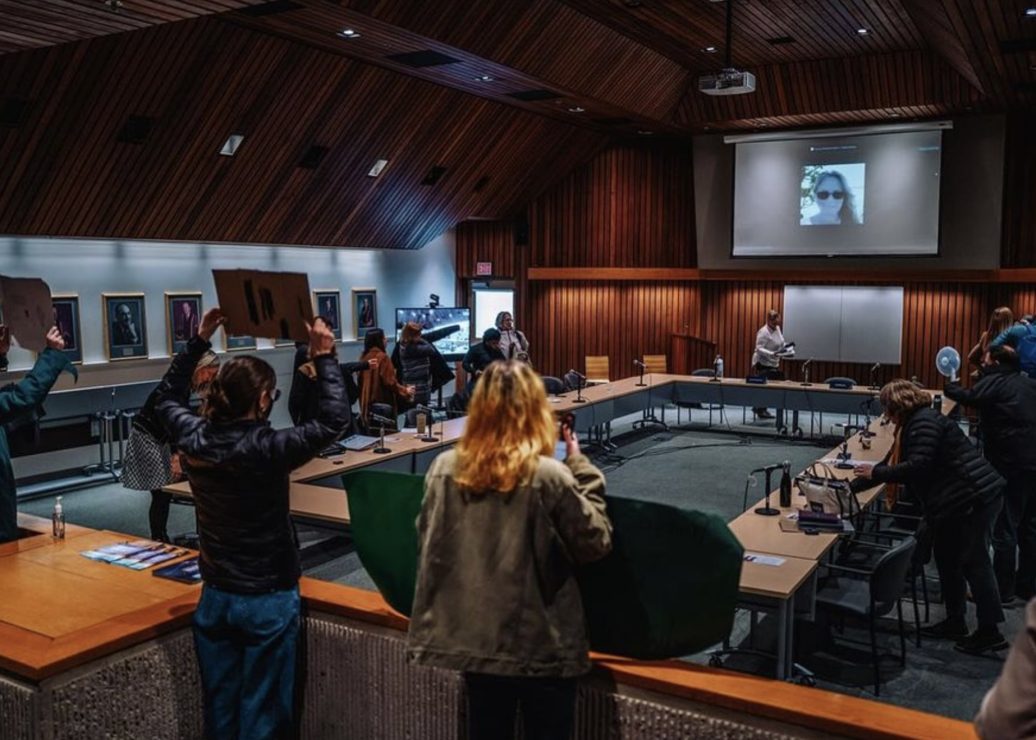Student protesters remain concerned by the university’s lack of action

Protesters interrupt the Nov. 28 Board of Governors meeting. Photo by Mike Graeme.
UVic has responded to a pro-Palestinian student group after they disrupted the Nov. 28 Board of Governors (BoG) meeting.
The Victoria Student Mobilization Committee (VSMC), a branch of the University of Victoria Students in Solidarity with Palestine (UVSSP), is the group behind the recent protest at the BoG meeting.
According to the UVSSP, UVic President Kevin Hall has replied and agreed to a meeting. One representative will be included from each student group that signed a letter to the university calling for action, including public condemnation of the Israeli government’s actions as well as divestment from companies that “support Palestinian occupation and genocide.” The meeting with Hall will take place over Zoom in the new year.
“We wish the University had acted with more urgency in responding to us,” said the UVSSP in a statement to the Martlet, adding that “the proposed meeting date is around two months since we delivered our letter.”
Group member Dom, who chose only to reveal his first name, explained the UVSSP’s goals in an interview with the Martlet. “It provides a centralized body for which Palestinian solidarity work can be organized and coordinated from,” he said. “The [group] being based on the UVic campus has the goal of pressuring university administrators into action on the ongoing genocide in Palestine.”
The group was formed after Hamas — the group that governs the Gaza Strip — attacked Israel on Oct. 7, prompting a war between the two. As of Dec. 21, the death toll in Gaza is reported to be 20 000. The initial attack killed nearly 1 500 Israelis.
Effy, who also chose to keep their last name anonymous, is an Anti-Zionist Jewish organizer and member of the VSMC. In an interview with the Martlet, they explained why the group chose to attend the meeting on Nov. 28.
“It was an escalation,” they said, explaining that on Nov. 8, three days after their initial walkout, the group sent a letter to President Kevin Hall and received no response. They organized another walkout, but “were met with locked doors,” said Effy, adding that they decided on protesting at the meeting “because we need to be heard.”
Minutes into the board meeting, following the presidential address, VSMC members called out to Hall, asking for their concerns to be addressed. The Board continued its meeting without acknowledging the protesters, and adjourned shortly after the protest began.
In an emailed statement sent to the Martlet, a UVic spokesperson acknowledged the protest. “Freedom of expression and engagement with challenging topics is vital to academia and we encourage thoughtful, reasoned, and respectful academic discourse,” reads the email. “In addition to public statements, over the past two months President Hall has met with groups representing Muslim and Jewish students, and the university is working hard to provide the supports students require.”
The VSMC is especially concerned with UVic’s investments in companies that “fund or benefit from Israeli apartheid,” said Effy. The group’s goal is for UVic to divest millions of dollars in companies, such as BlackRock, which is involved with RTX, an aerospace and defence company that they say contributes to the Israeli military.
“When I first heard that a higher institution was basically benefiting off of militarization and violence, I was so floored,” said Tay, an organizer for the VSMC and UVSSP who attended the Nov. 28 protest. “I just don’t see how a place that is committed to bettering our systems … [can] continue to fund and invest in these organizations.”
Dom also noted that UVic’s commitment to decolonization should extend to Palestine and the ways it has been affected by colonialism. “The second that anyone takes steps which genuinely challenge colonial structures and policies which threaten the university’s financial interests, they do absolutely everything in their power to stop it,” he said.
Tay said that the first step for students interested in supporting Palestinians is to understand the history of the conflict. “Take the time to learn about what’s happening and how it started,” she said, adding that the tension in Israel-Palestine began over 100 years ago with the founding of the modern Zionist movement.







